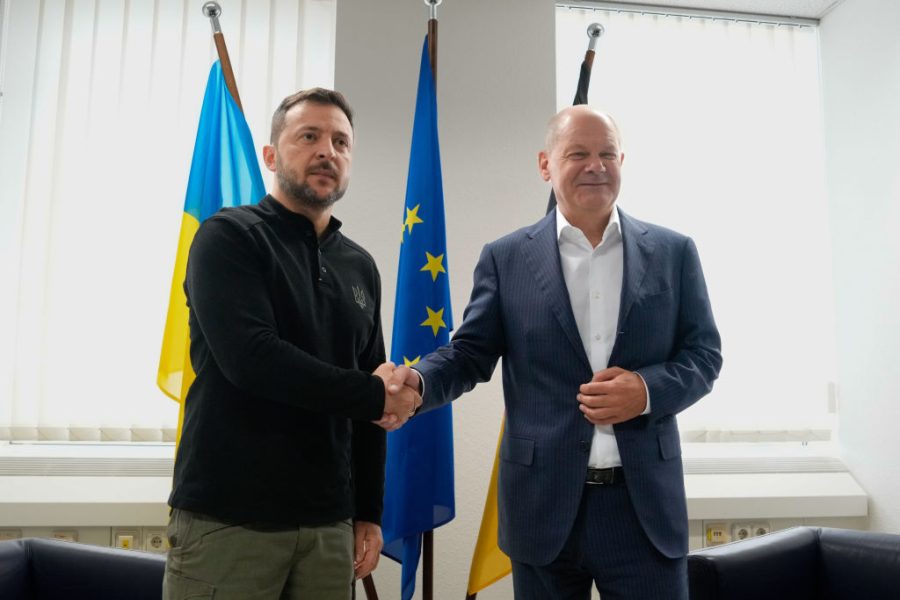Is German chancellor Olaf Scholz giving in to pressure to reduce support for Ukraine and improve relations with Russia? Scholz declared during a televised interview with the German network ZDF broadcast last night that any fresh peace talks to bring an end to Vladimir Putin’s invasion of Ukraine should also include Russia.
‘I believe that now is the time to discuss how we can arrive at a peaceful resolution from this war, at a faster pace than currently appears to be the case,’ Scholz said. ‘The [Ukrainian] president and I are in agreement that any talks should include Russia.’
Securing Russia’s attendance at future peace negotiations is, of course, another matter
Scholz’s comments come after a meeting with Volodymyr Zelensky in Frankfurt on Friday, during which the pair discussed ‘joint efforts to achieve a just and lasting peace for Ukraine’. Both the German and Ukrainian government read-outs on the meeting are vague, but confirmed that the two leaders discussed ‘possible next steps’ for another round of peace talks.
This wouldn’t be the first time that peace in Ukraine has officially been discussed. Allies of Kyiv first met in Switzerland for a ‘summit on peace in Ukraine’ in June. The purpose of the summit was to get a better understanding of Zelensky’s stipulations in any future peace negotiations with Russia. Representatives from over 90 countries came together to discuss nuclear safety, food security and humanitarian issues such as the exchange of prisoners and return of illegally deported Ukrainian children.
Crucially, however, Russia wasn’t involved in those discussions – despite Switzerland’s apparent ‘openness to extending an invitation’ to Moscow. The Kremlin dismissed the outcome of the Swiss summit at the time as ‘amounting to zero’.
Neither Scholz nor Zelensky gave any indication on Friday as to when this second round of peace negotiations might take place. Speaking in July, however, Zelensky spoke of his hope to have everything in place for peace talks by November and that ‘representatives of Russia should be at the second summit’. According to sources close to the Ukrainian government, Zelensky wants to convene a second peace meeting before the American presidential election takes place on 5 November. Many in Kyiv fear that the realistic prospect of a second Trump presidency could jeopardise an outcome of the war that would be fair to Ukraine.
Securing Russia’s attendance at future peace negotiations is, of course, another matter. While Putin and his officials have paid lip service to the idea of peace discussions and insisted several times that they are ‘open to dialogue’, there is little evidence to suggest that the Russian president is serious about the prospect of sitting down at the negotiating table with Zelensky.
Back in Germany, Scholz’s endorsement of including Putin in any future rounds of discussions over Ukraine’s future is not entirely selfless. A bruising set of state election results in Thuringia and Saxony at the start of the month indicated that support for the Chancellor’s SPD party, as well as his FDP and Green coalition partners, was on its knees. In a new survey published by ZDF on Friday, 72 per cent of Germans believe that Scholz’s government is ‘doing a bad job’.
The two parties that performed best in the state elections were the far-right Alternative für Deutschland (AfD) and left-wing Bündnis Sahra Wagenknecht (BSW). Both had made an end to Germany’s support for Ukraine and an improvement in relations with Moscow central campaign pledges – proving particularly popular with voters. Polling by Focus magazine in June revealed that over 80 per cent of AfD supporters were in favour of a ‘diplomatic solution’ to the conflict.
Germany’s next federal election is just over a year away now. With the CDU projected to take power and Scholz’s SPD polling several below the AfD, the Chancellor will be under pressure to mitigate the predicted disastrous result for his party. While twelve months leaves too little time for Scholz to address many of the factors driving voters away from the traffic light coalition and into the AfD and BSW’s arms, a change of tack on Ukraine could staunch the flow – at least a little.








Comments